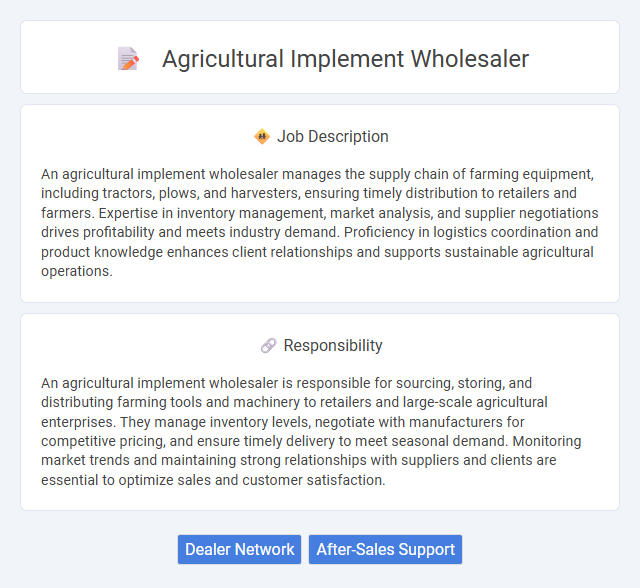
An agricultural implement wholesaler manages the supply chain of farming equipment, including tractors, plows, and harvesters, ensuring timely distribution to retailers and farmers. Expertise in inventory management, market analysis, and supplier negotiations drives profitability and meets industry demand. Proficiency in logistics coordination and product knowledge enhances client relationships and supports sustainable agricultural operations.
Individuals with strong physical stamina and an interest in agricultural machinery will likely find the role of an agricultural implement wholesaler suitable. Those comfortable with managing logistics, building client relationships, and navigating seasonal market fluctuations may adapt well to the demands of this job. People who prefer dynamic environments and have problem-solving skills might have a higher probability of success in this position.
Qualification
Agricultural implement wholesaler positions typically require strong knowledge of farming equipment, supply chain management, and customer service skills to effectively connect manufacturers with retailers. Candidates should possess a background in agribusiness, logistics, or sales, often evidenced by a degree or relevant industry experience. Proficiency in inventory management systems and negotiation techniques is essential for optimizing procurement, pricing, and distribution processes in the agricultural sector.
Responsibility
An agricultural implement wholesaler is responsible for sourcing, storing, and distributing farming tools and machinery to retailers and large-scale agricultural enterprises. They manage inventory levels, negotiate with manufacturers for competitive pricing, and ensure timely delivery to meet seasonal demand. Monitoring market trends and maintaining strong relationships with suppliers and clients are essential to optimize sales and customer satisfaction.
Benefit
Working as an agricultural implement wholesaler probably offers benefits such as competitive commissions and the potential for steady income due to ongoing demand in the farming sector. Access to a robust network of suppliers and customers may enhance career growth and business opportunities. There is likely an advantage in developing industry expertise, which can lead to increased job security and professional recognition.
Challenge
Working as an agricultural implement wholesaler likely involves navigating supply chain disruptions that can impact timely product availability. Managing fluctuating market demand and price volatility for farming equipment probably presents ongoing difficulties. Building and maintaining strong relationships with manufacturers and retailers may require careful negotiation and communication skills to overcome competitive pressures.
Career Advancement
Agricultural implement wholesalers play a crucial role in distributing farming equipment and machinery to retailers and farmers, requiring strong knowledge of product lines and market trends. Career advancement opportunities often include progressing to roles such as sales manager, regional distributor, or supply chain coordinator, which demand enhanced leadership and strategic planning skills. Gaining expertise in agricultural technology and developing robust client relationships significantly boosts prospects for promotion and long-term success in this sector.
Key Terms
Dealer Network
Managing a dealer network is vital for an agricultural implement wholesaler to ensure efficient distribution and market penetration. Establishing strong relationships with dealers helps streamline supply chains, improve inventory turnover, and boost sales performance across varied agricultural regions. Leveraging dealer feedback allows wholesalers to adapt product offerings and support services to meet dynamic farm equipment demands effectively.
After-Sales Support
Providing exceptional after-sales support is critical for agricultural implement wholesalers to ensure customer satisfaction and loyalty. This includes timely maintenance services, effective troubleshooting, and availability of genuine spare parts to maximize equipment uptime and performance. Strong after-sales support fosters trust, encourages repeat business, and strengthens long-term client relationships within the agricultural sector.
 kuljobs.com
kuljobs.com